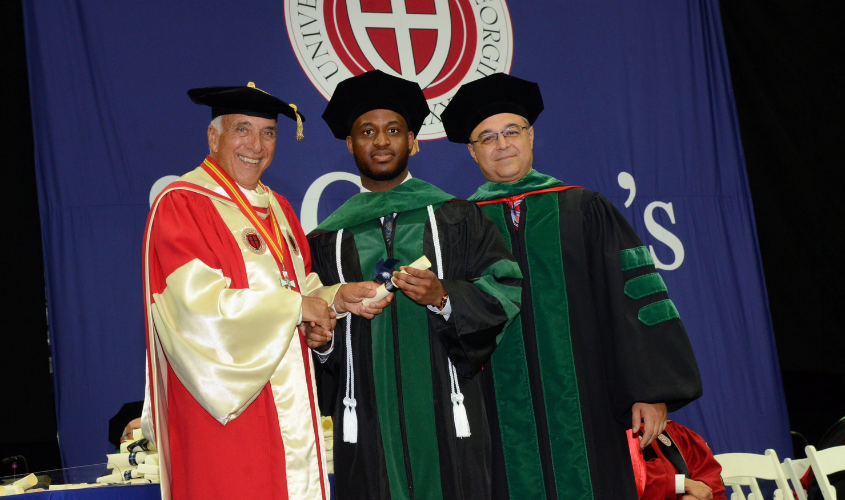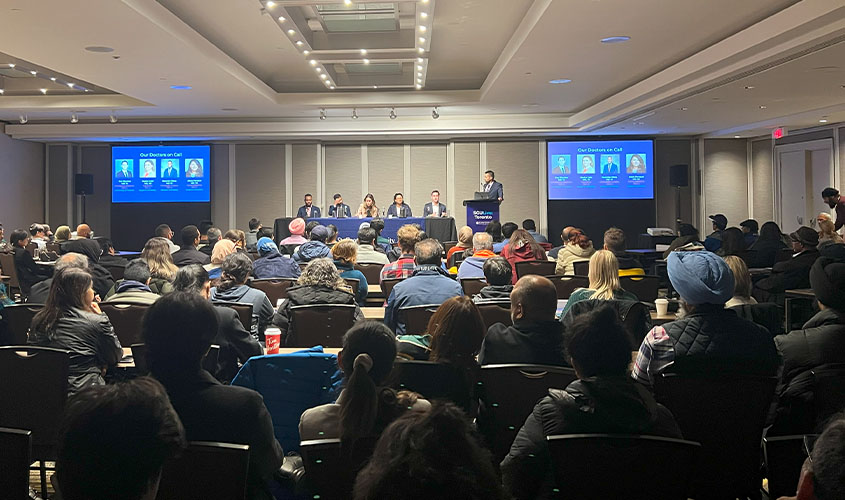Ifeatu Egwuatu, MD
Ifeatu Egwuatu, MD ’23, from the Anambra state of Nigeria, was determined to become a doctor following a tragic incident of his beloved cousin who passed away at a young age. He chose to pursue medicine because he wanted to make a difference in people’s lives.
Dr. Egwuatu completed his first year of basic sciences in the UK through a partnership between St. George’s University School of Medicine and Northumbria University. He then traveled briefly to Grenada for his second year, and eventually to New York to complete his clinical rotations there.
His experience at SGU led him to successfully match into an internal medicine residency at Atlantic Health System’s Morristown Medical Center in Morristown, NJ—his first choice for residency.
Dr. Egwuatu shared more details about his medical school experience and why he thinks international medical students should consider SGU.
SGU: Describe what it felt like when you matched for residency?
Dr. Egwuatu: While it’s a feeling I still think about a lot, I would struggle to recreate it even if I tried. My journey from starting my bachelor’s degree in the UK to studying medicine at SGU to finally matching lasted close to a decade and unsurprisingly came with challenges along the way. To match felt like going against the odds and getting rewarded for staying focused on my end goal.
SGU: What was your experience during the match process? How did SGU’s Office of Career Guidance (OCG) help you during that time?
Dr. Egwuatu: Overall, I enjoyed the interview process as it provided the perfect opportunity to see whether I would fit into a particular program. The OCG team had virtual seminars to give us helpful pointers and keep us aware of certain deadlines during the match process. My clinical advisor (who was also part of the OCG team), advised me on approaches to take while I was waiting for my first interview.
SGU: Why did you pursue internal medicine?
Dr. Egwuatu: I chose internal medicine because the maintenance of good health through preventive medical care, the diagnostic and therapeutic processes of identifying and treating ill health, and the vast opportunities to advance medical care through research—all combining seamlessly to improve patient health—greatly appealed to me.
Additionally, my experiences during my core rotations at high patient volume hospitals strengthened my patient interaction skills, exposed me to the art of making diagnoses that do not present in a textbook manner, and gave me firsthand exposure into the tangible improvements in patient health resulting from medical interventions. These experiences essentially reaffirmed the veracity of my desire to pursue a career in internal medicine.

SGU “was an excellent decision as they provided me the opportunity to study medicine, form lifelong relationships and connections with people from various countries worldwide, and ultimately match into my first-choice program in internal medicine.” — Ifeatu Egwuatu, MD ’23
SGU: How do you balance work and your personal life?
Dr. Egwuatu: Having been on the board of the SGU’s Student Government Association, I had the opportunity to hone the skill of time management by combining my responsibilities with the SGA with that of medical school in such a manner that I was able to maintain a high standard in both areas effectively.
SGU: What are your ultimate career aspirations?
Dr. Egwuatu: I want to pursue a career in gastroenterology. Nevertheless, my experiences during residency could still lead me to consider other subspecialties like cardiology or pulmonology/critical care, so I will keep all options open at this stage.
SGU: How did SGU help you with your academic achievements and USMLE preparation?
Dr. Egwuatu: SGU gave me a solid foundation during my basic sciences and USMLE Step 1 exam preparation, because the style of learning and assessments during my bachelor’s was very different to the learning style in medical school, which was naturally fast paced. As I progressed further, my clinical academic advisor supported me during my clinical years by giving me pointers on how to approach the shelf exams, Step 2 CK, and the match process.
SGU: Why did you choose the UK for your basic sciences?
Dr. Egwuatu: I did my bachelor’s in the UK at the University of Surrey, so the opportunity to continue my basic sciences through the partnership program in the UK made a lot of sense, as I had made many friends during my bachelor’s degree studies.
SGU: What were basic sciences like in the UK? Where did you do your clinical rotations?
Dr. Egwuatu: Doing my basic sciences in the UK played a part in helping me get comfortable with the culture of being a medical student, as the smaller class sizes provided a solid foundation for a close-knit working relationship between the faculty and students. For my clinical rotations, I spent both years in New York, as I wanted a new experience having previously spent most of my time in the UK.
SGU: What was your favorite part about living in Grenada?
Dr. Egwuatu: Although I was on the island very briefly due to the COVID pandemic during my second year, I was thrilled to enjoy the modern facilities and study spaces on the school campus, amazing local food, as well as the beaches and numerous tourist attractions that Grenada offers.
SGU: Why should students in Africa consider going to SGU for medical school?
Dr. Egwuatu: The pathway to getting into medical school in either the UK or the US can be challenging, and despite doing well on both the MCAT and UKKAT (now UCAT), I was unable to secure admission into any UK/US-based medical school.This is where the SGU came in, and in hindsight, it was an excellent decision as they provided me the opportunity to study medicine, form lifelong relationships and connections with people from various countries worldwide, and ultimately match into my first-choice program in internal medicine.
